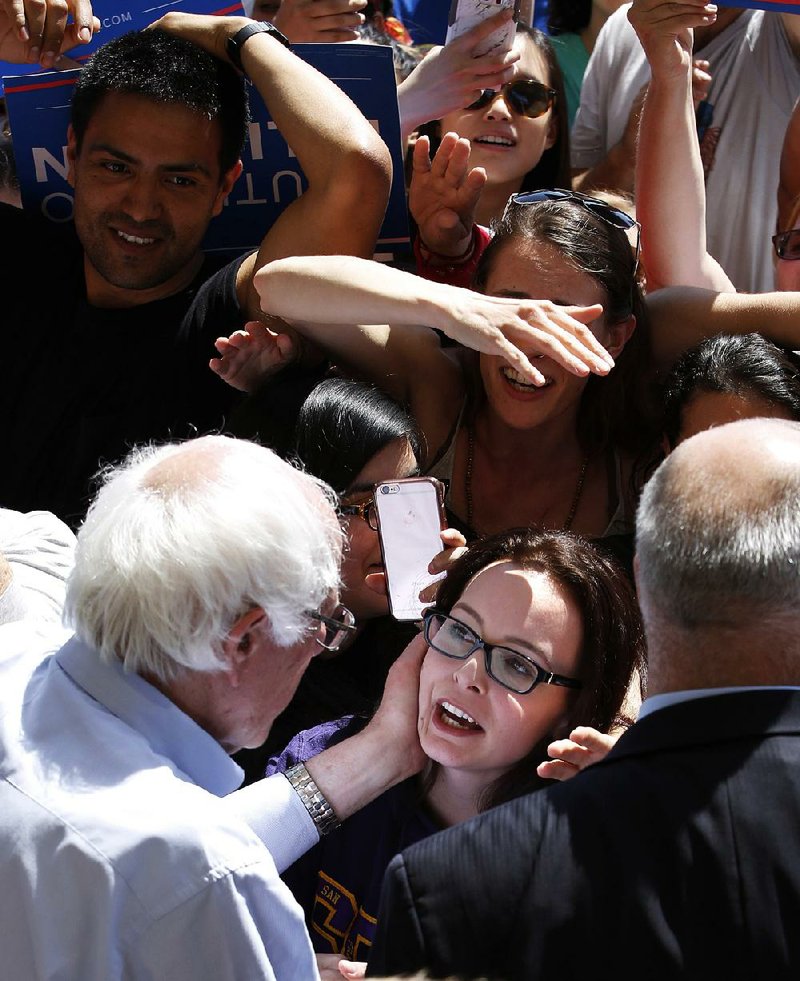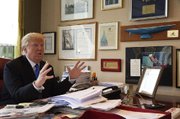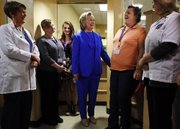LOUISVILLE, Ky. -- The delegate fight continued Tuesday between the two Democratic candidates, with Bernie Sanders snagging a win in West Virginia over former Secretary of State Hillary Clinton.
FULL ELECTION COVERAGE
Republican Donald Trump picked up another pair of wins Tuesday -- in West Virginia and in Nebraska -- a week after his two remaining GOP rivals dropped out of the presidential race.
"It is a great honor to have won both West Virginia and Nebraska, especially by such massive margins," Trump said in a statement Tuesday night. "My time spent in both states was a wonderful and enlightening experience for me."
In West Virginia, Sanders and Clinton split the delegates with Sanders gaining an edge that did little to chip away at Clinton's lead. In Nebraska, Clinton won the party's nonbinding presidential primary, but a larger share of the state's delegates already had been pledged in March caucuses to support Sanders, a U.S. senator from Vermont.
Sanders has vowed to fight on. On Tuesday, he campaigned in California, which holds its primaries on June 7, and in Oregon, which votes next week.
"West Virginia is a working-class state, and like many other states in this country, including Oregon, working people are hurting," Sanders said at a rally Tuesday night in Salem, Ore. "And what the people of West Virginia said tonight, and I believe the people of Oregon will say next week, is that we need an economy that works for all of us, not just the 1 percent."
Ahead of Tuesday's voting, Clinton was 155 delegates short of the 2,383 needed to secure the Democratic nomination, when factoring in public support from superdelegates. To win the nomination, she needs just 17 percent of the delegates at stake in the remaining contests.
That means she could lose all the states left to vote and still emerge as the nominee, as long as all of the superdelegates continue to back her.
On Tuesday, Edward Milam of Cross Lanes, W.Va., a self-described socialist who gave money to the Sanders campaign, said he voted for Clinton.
"After about six, seven months of debating and watching, I think Hillary has a lot more to offer than Bernie internationally," the 68-year-old retiree said. "I think she handles herself well. I've known about her for 30 years, just like everybody else has. I don't think there will be any surprises."
Running-mate list
Tuesday's victories gave Trump all of the 36 delegates from Nebraska and at least three from West Virginia. The remaining 31 delegates are directly elected by voters, with the ballots listing which candidate each delegate will support.
With the Republican nomination all but secure, Trump has narrowed his list of potential running mates to "five or six people," all with extensive political resumes.
He said he has not ruled out New Jersey Gov. Chris Christie, a former rival who has endorsed the businessman's campaign.
"I have a list of people that I would like," Trump said Tuesday in an interview.
The former reality television star said he's giving special weight to political experience because he wants a vice president who can help him "with legislation, getting things through" Washington if Trump wins the White House.
"We don't need another business person," said Trump, who touts himself as one of the best in that category.
He also said that choosing a person who has previously held elected office would help in the vetting process, in part because that person's background already would have been checked out by voters, the news media and to some extent the government.
"For the most part, they've been vetted over the last 20 years," he said.
Trump would not reveal the full list of possible running mates but said his decision this week to appoint Christie to head his White House transition team did not mean that the New Jersey governor is out of consideration.
"No, not at all," he said.
Some in the GOP see Trump's vice presidential pick as crucial to easing party concerns about Trump's lack of political experience and his temperament to serve as commander in chief. Also, tapping a political insider would be a way for Trump to signal a willingness to work with the party establishment that he has bashed throughout the primary.
But the party shouldn't expect any announcement soon. "I don't want to make a decision until the actual convention. Not even before it. I mean, until it," Trump said.
Former Texas Gov. Rick Perry and former Arizona Gov. Jan Brewer are among the Republicans who have suggested they would be open to joining Trump on the GOP ticket. Others, including Trump's former primary rival U.S. Sen. Marco Rubio of Florida, have ruled out being considered.
"I have never sought, will not seek and do not want to be considered for vice president," Rubio wrote in a Facebook post Monday.
Ryan on Trump
With the bulk of primary campaigning over, Trump still faces the task of uniting party leaders around his campaign. Mitt Romney, John McCain and other prominent Republicans have distanced themselves from the New Yorker. House Speaker Paul Ryan, too, has withheld his support.
Ryan defended his stance anew Tuesday, insisting that he was just being honest in saying Trump had more work to do to show that he could unify the party after alienating numerous voters, including women, Hispanics and many conservatives.
"It is going to take more than a week to unify this party," Ryan said in an interview with The Wall Street Journal that was broadcast online. "If we just pretend to unify without unifying, then we'll only be at half-strength, and it won't be good for us in the fall."
GOP Sen. Ted Cruz of Texas, Trump's leading opponent before he dropped out of the race last week, made it clear that he is in no hurry to endorse the businessman who defeated him.
"The voters in the primary seem to have made a choice, and we'll see what happens as the months go forward," Cruz told conservative talk-radio host Glenn Beck.
On Monday, Trump released his line-up of California delegates, which included Majority Leader Kevin McCarthy, the second-ranking Republican in the U.S. House, and U.S. Reps. Darrell Issa and and Duncan Hunter. Issa, who had backed Rubio, endorsed Trump last week.
In California -- the nominating contest's largest prize -- Republican presidential campaigns can select delegates to vote for their candidates at the national convention, but the June 7 primary determines how many delegates each candidate gets.
On Thursday, Ryan; Senate Majority Leader Mitch McConnell, R-Ky.; and other congressional Republicans are scheduled to meet with Trump.
"We have a nominee, it looks like he may well be very competitive, and we want to win the White House," McConnell told reporters in Washington. "We know that Hillary Clinton will be four more years of Barack Obama. I think that's going to in the end be enough to unify Republicans across the country."
Clinton on child care
Even as the primaries continue, Clinton has largely shifted her focus to the general election.
"I don't care about what he says about me," she said of Trump on Tuesday. "But I do resent what he says about other people, other successful women, women who have worked hard, women who have done their part."
On Monday, she courted suburban women in Virginia and, on Tuesday in Lexington, Ky., she released a proposal to ensure that families don't spend more than 10 percent of their income on child care.
"It just doesn't make sense," Clinton said of the cost of quality care for young children and the difficulties that working parents face. "It's the most important job that any of us can do, and we're making it really hard and really expensive."
"Secretary Clinton is acutely aware that the middle class is extremely stretched when it comes to affording quality child care," campaign policy adviser Ann O'Leary said in a statement. "While middle-class wages have stagnated in the last decade, costs of child care have gone up by nearly 25 percent."
The Clinton campaign said the monthly cost of sending two children to a quality child care center is higher than the average cost of rent in every state. In a majority of states, the cost of infant care is higher than the tuition at public universities, the campaign statement claimed.
Clinton visited a health care center in Louisville later Tuesday before an evening rally.
Kentucky has its Democratic primary next week.
Clinton's focus on family services and the cost of child care came as a preview of a possible general election strategy against Trump, the likely GOP nominee.
On Monday, she talked about schools, child care and family budgets with a small group of invited guests at a coffee shop in suburban Loudoun County, Va., a key swing state.
She deflected reporters' questions about whether it is fair or appropriate for Trump to raise the issue of former President Bill Clinton's infidelity.
"I'm going to let him run his campaign however he chooses," she said in Virginia. "I'm going to run my campaign, which is about a positive vision for our country with specific plans that I think will help us solve problems that we're facing."
Information for this article was contributed by Lisa Lerer, Ken Thomas, John Raby, Josh Funk, Grant Schulte, Michael R. Blood, Julie Pace, Jill Colvin, Erica Werner, Steve Peoples, Matthew Daly, Richard Lardner and Andrew Taylor of The Associated Press; by Anne Gearan, Abby Phillip, John Wagner and staff members of The Washington Post.
A Section on 05/11/2016


